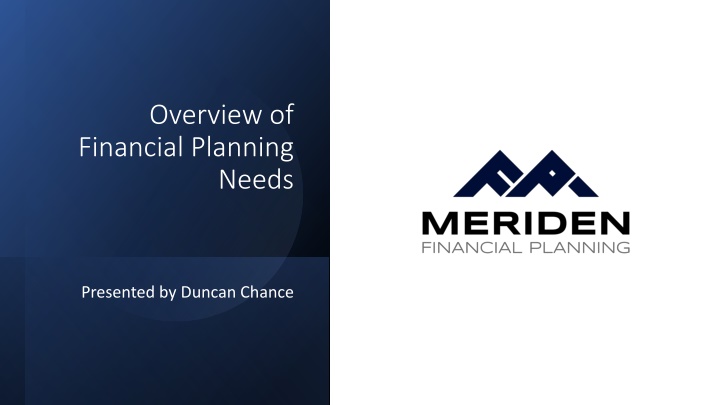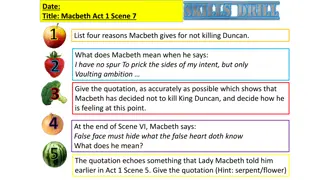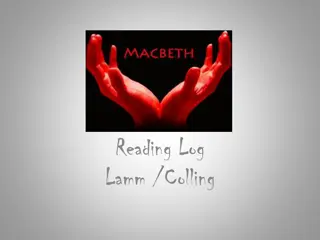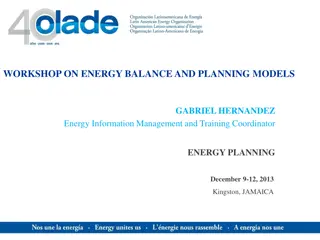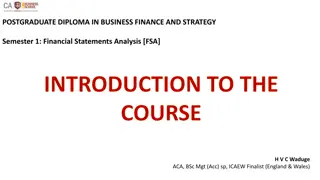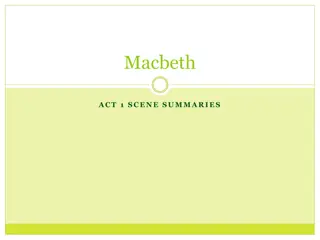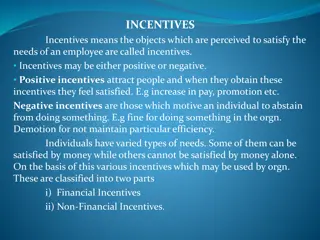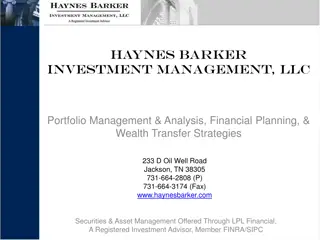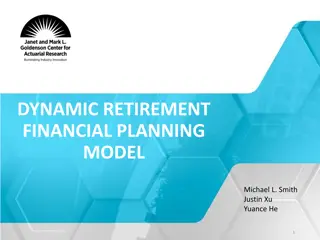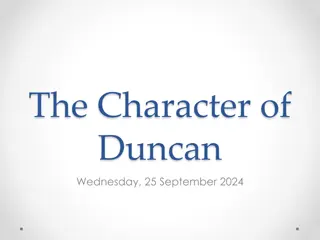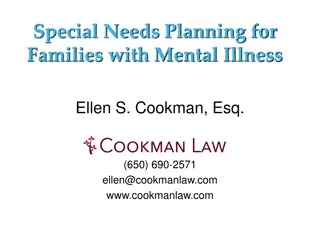Financial Planning Needs Presented by Duncan Chance
This overview covers financial planning needs presented by Duncan Chance from Meriden Financial, including topics like pensions, tax planning, income protection, mortgages, and more. The content discusses defined benefit versus defined contribution pensions, considerations for early retirement, death benefits, and tax planning within pension schemes. It also highlights the firm of Independent Financial Advisers based in Stourbridge, led by Duncan Chance and supported by experienced directors.
Download Presentation

Please find below an Image/Link to download the presentation.
The content on the website is provided AS IS for your information and personal use only. It may not be sold, licensed, or shared on other websites without obtaining consent from the author.If you encounter any issues during the download, it is possible that the publisher has removed the file from their server.
You are allowed to download the files provided on this website for personal or commercial use, subject to the condition that they are used lawfully. All files are the property of their respective owners.
The content on the website is provided AS IS for your information and personal use only. It may not be sold, licensed, or shared on other websites without obtaining consent from the author.
E N D
Presentation Transcript
Overview of Financial Planning Needs Presented by Duncan Chance
Agenda Introduction to Meriden Financial Planning Pensions/tax planning Income protection/Permanent health insurance Wills, etc. Mortgages/Business loans Annual allowance issues Estates/Inheritance tax planning Any other business and questions
We are a firm of Independent Financial Advisers (IFA s) based in Stourbridge and advise on clients across the West Midlands, Worcestershire and Birmingham area. Introduction to Meriden Financial The firm is head up by Duncan Chance, supported by fellow Directors Richard Chapman and Richard Oliver. Planning We are a team of 15 ranging from apprentice s to advisers approaching retirement with vast years of experience. We feel with the ever-changing uses of technology and legislation, both are essential to run a modern IFA firm.
Defined Benefit vs Defined Contribution Pensions Defined Benefit Occupational Schemes provided by employers. They can be found in both the public and private sectors. Defined Contribution Occupational Schemes or those set up by individuals directly. Final Salary vs CARE Final Salary Pension is calculated by dividing number of years you have been a member of the scheme by the accrual rate (usually 60 or 80). This is then multiplied by your salary at the point you retired. CARE (Career Average Revalued Earnings) is based on an average of your salary across your scheme membership. The accrual rate is multiplied by this average to reach the yearly pension.
Pensions (continued) Early Retirement Factors In a defined benefit scheme, where a member wishes to take their pension before the Normal Retirement Date, a calculation is carried out to determine the pension they should receive. This may be significantly less than they would receive at the Normal Retirement Age. Death benefits The Death Benefits available within each scheme will be set by the scheme rules. This is usually a spouses/civil partner s pension with a percentage of the value of your normal pension paid to them. Some schemes may also offer a children s pension.
Pensions (continued) DC Scheme These are invested in the markets with no guarantee as to the future income. Death Benefits can vary widely from a spouse s pension down to flexi-access drawdown. Tax planning Pensions fall outside the estate for IHT. Where flexible payments can be taken, this can also help reduce income tax, especially once the policyholder has less income either due to retirement or semi-retirement. Tax-free cash of up to 25% and all funds held within a pension are also not subject to Capital Gains Tax.
What does it cover? Income It provides weekly or monthly income to those who are unable to work due to long- term illness or incapacity. Protection/Permanent Health Insurance Own Occupation vs Any Occupation Own Occupation is generally more expensive as payment is made even if you would be able to perform other occupations. Any Occupation is usually a cheaper option but would only pay out in the event the policyholder was unable to be employed in any occupation.
Deferral Periods A waiting period before the claimed for benefit is payable. Common deferral periods are 13, 26, 52 or even 104 weeks. The longer the period, the cheaper the premiums. Deferral periods can be linked to the period of time that sick pay would be payable. Benefit Amount Amount paid by the insurer is usually a percentage of the policyholders average monthly gross earnings in the year prior to incapacity. Reviewable/Guaranteed Premiums Guaranteed Premiums - the premiums are guaranteed throughout the like of the policy. Reviewable premiums at the end of each year, the insurer has the right to increase the level of premiums paid for the policy. This will be based on the overall claims experience of the insurer and is not based on the claims experience of that one policy.
What happens if I die intestate? This depends on the circumstances of the deceased. Spouse and no children (regardless of estate amount) spouse will inherit all funds Spouse and children (or other direct descendants)(where the estate is above 270,00) spouse receives all personal possessions as well as the first 270,000 of assets. The spouse then receives half of the remainder and the other half is split between the children equally. If a child pre- deceases their parent, that child s share of the fund will be split equally between their descendants if they have any. Do I need a will? What is an LPA? If no spouse or children estate is passed to certain family members in a certain order but if no family, estate is passed to the Crown.
Property and Financial Affairs Lasting Powers of Attorney Once registered with the Office of the Public Guardian and if desired, can be used before the donor has lost mental capacity. Can be particularly useful if the donor is out of the country for long periods or even if they are mentally capable and just physically unable to get somewhere. Health & Welfare Can only be used once the donor has lost mental capacity. These can include making decisions about, where the donor will live, their medical care and daily routine.
Care Fees and Tenancy in Common Losing your home is one of the biggest worries people have about entering care. If your spouse etc, is still living in the home, this will not be counted towards your level of assets and they will not be forced out. However, when one spouse pre-deceases the other, and the surviving spouse needs to go into care, the individual may need to sell their home in order to pay for care. Tenants in Common each spouse will own a share (usually 50/50) and on death that share is passed to whomever the Will states. Therefore, after second death, the property is owned by the surviving spouse and one other (usually a child or even a Trust). On the time the second spouse has to enter care, the council cannot force a sale. After all, who would buy half the ownership of a house?
Mortgages/BTLS/Tax FIRST TIME BUYERS/BANK OF MOM AND DAD DEPOSITS BUY TO LETS LIMITED COMPANY BTLS S TAX?
Annual Allowances ISA Currently 20,000 for the 2021/2022 tax year. Differen types of ISA but allowance is overall. Also available is the Additional Permitted Subscription on the death of one spouse. Lifetime ISA Between ages 18-40 can open a Lifetime ISA and can contribute up to 4,000 per annum (counts towards 20,000 ISA Allowance). Government will add 25% each year (bonus does not count towards the allowance). Can continue to invest into a Lifetime ISA until age 50. Can hold Stocks & Shares and cash. Funds must be withdrawn to purchase your first home or after age of 60. Can take funds at other times but will pay a withdrawal charge of 25%.
Pension Up to 40,000 in the 2021/22 tax year OR 3,600 (gross) where no earnings. Money Purchase Annual Allowance ( 4,000) once funds crystallised. Capital Gains Tax Allowance of 12,300 for each individual. Payable at the point of sale of certain assets such as additional properties. The tax is paid at 10% by basic rate tax payers and 20% by higher and additional rate payers. When selling property, this is 18% ad 28% respectively.
Personal Tax Allowance Every individual has a personal allowance of 12,570 per annum. However, once income exceeds 100,000 per annum, the personal allowance is reduced by 1 for every 2 over the allowance. Therefore, if your income is at or above 125,140, the personal allowance is reduced to nil. Dividend Allowance Allowance of 2,000 Savings Allowance Basic Rate Taxpayers - 1,000 Higher Rate - 500 Additional Rate - 0
Nil Rate Bands 325,000 for the 2021/22 tax year Residential Nil Rate Band 175,000 for the 2021/22 tax year. Can be claimed when the main residence is passed to the direct descendants. Inheritance Tax (IHT) PET s These are non-exempt gifts to individuals. Bare Trusts and Disabled Trusts. After 7 years, the funds fall outside the estate. If death is within 7 years, the value of the transfer falls within the estate and uses the Nil Rate Band first.
Some gifts automatically fall outside of the donor s estate as soon as it is made. These include: 3,000 annual exemption this is per year and not per gift Small gifts of up to 250 to any person in any tax year. (cannot form part of a larger gift). A gift made out of normal expenditure. Other gifts: When certain Gifting Exemptions individuals make wedding gifts, depending on the donor s relationship to the parties involved. Gifts to charities.
Business Relief (AIM/EIS/Trading Business) Whole of Life Insurance
